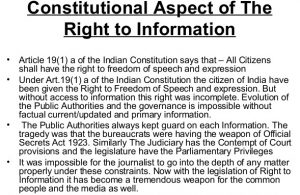The insertion of a basic right into a constitution requires compelling justification based on sound theoretical reasoning. This Section will provide the conceptual justification for the constitutional anchoring of the right to information. After identifying and reviewing the many grounds supporting legal recognition of the right, this Section concludes that the majority of those grounds belong to the constitutional sphere inasmuch as they relate to the “rules of the game.” They sustain democracy as well as the basic human rights recognized by the world’s enlightened regimes. These arguments provide evidence for the centrality and constitutionality of the right to information. While elaborating on each of the justifications, this Article will show how they support the constitutional character of the right to information
The constitution guarantees the fundamental rights to free speech and expression. The prerequisite for enjoying this right is knowledge and information. The absence of authentic information on matters of public interest will only encourage wild rumors and speculations and avoidable allegations against individuals and institutions. Therefore, the Right to Information becomes a constitutional right, being an aspect of the right to free speech and expression which includes the right to receive and collect information. This will also help the citizens perform their fundamental duties as set out in Article 5 1A of the Constitution. A fully informed citizen will certainly be better equipped for the performance of these duties. Thus, access to information would assist citizens in fulfilling these obligations.
RIGHT TO INFORMATION IS NOT ABSOLUTE
As no right can be absolute, the Right to Information has to have its limitations. There will always be areas of information that should remain protected in public and national interest. Moreover, this unrestricted right can have an adverse effect of an overload of demand on administration. So the information has to be properly, clearly classified by an appropriate authority.
The usual exemption permitting Government to withhold access to information is generally in respect of the these matters:
(1) International relations and national security;
(2) Law enforcement and prevention of crime;
(3) Internal deliberations of the government;
(4) Information obtained in confidence from some source outside the Government;
(5) Information which, if disclosed, would violate the privacy of an individual;
(6) Information, particularly of an economic nature, when disclosed, would confer an unfair advantage on some person or subject or government;
(7) Information which is covered by legal/professional privilege, like communication between a legal advisor and his client and
(8) Information about scientific discoveries and inventions and improvements, essentially in the field of weapons.
These categories are broad and information of every kind in relation to these matters cannot always be treated as secret. There may be occasions when information may have to be disclosed in public interest, without compromising the national interest or public safety. For example, information about deployment and movement of armed forces and information about military operations, qualify for exemption. Information about the extent of defense expenditure and transactions for the purchase of guns and submarines and aircraft cannot be totally withheld at all stages.
NEED FOR RIGHT TO INFORMATION
The Right to Information has already received judicial recognition as a part of the fundamental right to free speech and expression. An Act is needed to provide a statutory frame work for this right. This law will lay down the procedure for translating this right into reality.
Information is indispensable for the functioning of a true democracy. People have to be kept informed about current affairs and broad issues — political, social and economic. Free exchange of ideas and free debate are essentially desirable for the Government of a free country.
In this Age of Information, its value as a critical factor in socio-cultural, economic and political development is being increasingly felt. In a fast developing country like India, availability of information needs to be assured in the fastest and simplest form possible. This is important because every developmental process depends on the availability of information.
Right to know is also closely linked with other basic rights such as freedom of speech and expression and right to education. Its independent existence as an attribute of liberty cannot be disputed. Viewed from this angle, information or knowledge becomes an important resource. An equitable access to this resource must be guaranteed.
According to Mr. P.B. Sawant, “the barrier to information is the single most cause responsible for corruption in society. It facilitates clandestine deals, arbitrary decisions, manipulations and embezzlements. Transparency in dealings, with their every detail exposed to the public view, should go a long way in curtailing corruption in public life.”

